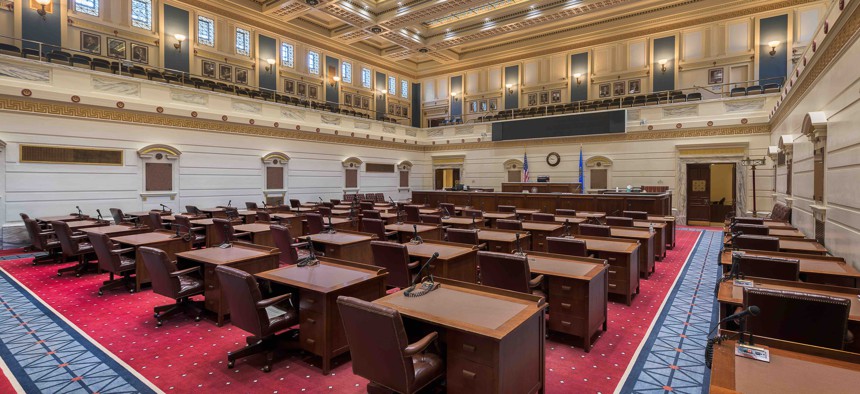Connecting state and local government leaders
Recent days have seen spending reductions and downbeat revenue forecasts.
The mark the coronavirus is leaving on state budgets became more apparent in recent days, as governors took action to reduce spending and gloomy new revenue estimates emerged.
Oklahoma Gov. Kevin Stitt on Friday said his state is now expecting a revenue shortfall of about $416 million for fiscal year 2020, which ends June 30. The state had planned for $7.8 billion of general fund revenue in this budget cycle, according to figures that the National Association of State Budget Officers issued last fall.
As one of the nation’s top oil and gas producing states, Oklahoma is facing financial challenges on top of those from the coronavirus due to a crash in oil prices.
“We must be very cautious and remain fiscally prudent to restrain spending as we work with the legislature on next year’s budget,” Stitt said in a statement.
“It will take time to fully understand the impact Covid-19 will have on our state revenue,” the governor added, referring to the respiratory illness the virus causes.
Oklahoma’s rainy day fund balance is about $806 million, according to the governor’s office. Up to $302 million of that sum is constitutionally available to the legislature to supplement the 2020 budget.
And because the governor has issued an emergency declaration, the state legislature is authorized to access an additional 25% of the fund, or $201 million, Stitt’s office said.
In Washington state, Gov. Jay Inslee last week used his line-item veto authority on 147 expenditure items, cutting $235 million from a supplemental operating budget that lawmakers approved in March.
The vetoes will also lower spending by another $210 million in the state’s next two-year budget, the governor’s office said, for total reductions of nearly $445 million.
“Under normal circumstances, I would not veto bills and budget items that are good policy and smart investments for the state. As everyone knows, these are not normal times,” Inslee said.
“As we address the health crisis, we must also look ahead to ease as much fiscal pain as we can,” he added. “It is all but certain that we will need to make adjustments to our next budget cycle and we must get started now.”
Inslee’s office said that some of the spending he vetoed included nearly $116 million over the next three years to provide additional guidance counselors at high-poverty elementary schools and $50 million that would have been put into a new climate resiliency account.
Missouri Gov. Mike Parson last week announced $180 million in spending “restrictions,” which he said were intended to keep the state’s budget balanced and to ensure the state has the money needed to fight Covid-19. “When we began this year we anticipated economic growth, and we had based our budget on that growth,” Parson said.
The governor said that the state was now estimating a revenue shortfall of over $500 million through the close of the state’s fiscal year at the end of June. Missouri had planned on about $9.8 billion in general fund revenue for fiscal 2020, according to the NASBO figures.
Parson said the budget may still need to be hemmed in further. The governor’s office also said last week that the state was “hopeful” for an additional $315 million in federal funding this year to help fill in its anticipated budget gap.
Of the spending restrictions Parson announced, almost $64 million targeted four-year higher education institutions or specific University of Missouri programs. Another $11.6 million in restrictions applied to community colleges.
In New York, Gov. Andrew Cuomo signed the state’s fiscal 2021 budget on Friday. The state’s fiscal year runs from April 1 to March 31.
Budget director Robert Mujica, Jr. said last week that the state expects a revenue shortfall between $10 billion and $15 billion.
The state will look at revenues throughout the year, he said, and make cuts as needed on a rolling basis to balance the budget. The extent of any forthcoming cuts will depend in part, Mujica added, on how much federal support materializes for the state.
New York faced a $7 billion budget gap even before the economic disruption from the virus, the state’s Citizens Budget Commission president, Andrew Rein, pointed out. Rein also said that the planned process to make the rolling spending cuts lacks sufficient transparency.
As it stands, the process gives the state's budget director—who is appointed by the governor—sway over the reductions if the legislature does not adopt its own spending cut plan in a set timeframe.
The state's budget also authorizes $8 billion in short-term debt, which could help cover New York's cash flow needs due to an extension of the income tax filing deadline, Rein noted. This borrowing is supposed to be repaid by the end of the fiscal year, but can be extended. The state will also have access to a $3 billion line of credit.
“That debt should not be extended or repaid with long-term debt,” Rein said. “Using long-term debt for operating purposes obligates future generations of New Yorkers to pay for today’s services and needs; this should only be done as a last resort."
New York, like other states and the federal government, has pushed its income tax filing deadline to July to give taxpayers more flexibility during the disease outbreak. As a result, the collection of large chunks of state revenue is expected to be delayed compared to past years.

NEXT STORY: The Economy Is Ruined. It Didn’t Have to Be This Way.




